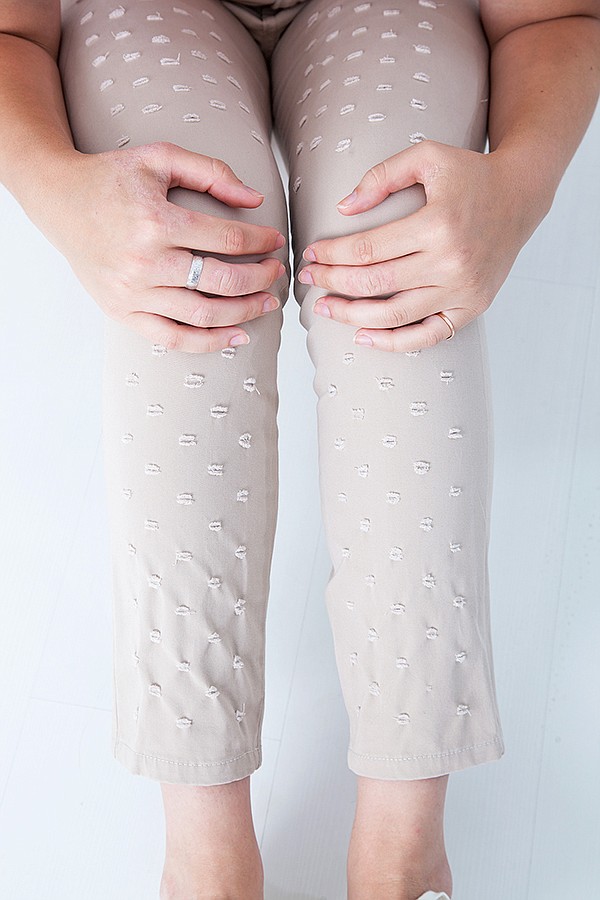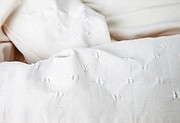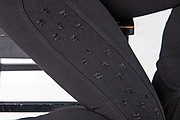MANUFACTURING
Butterfly Artifact Enters the Market With Fresh Distressed Designs
Furniture designer Eileen Kennedy has enjoyed success through her Pulse Requisite custom-furniture business, Juice line of wood furniture and Rain fire-resistant trivets. As a graduate of New York’s Skidmore College art program, the creative mind of Kennedy will not allow her to rest. Recently she hit the apparel-trade-show circuit to introduce Butterfly Artifact, a direct-to-consumer denim brand that offers a fresh approach to distressed styles. It made its trade-show debut during L.A. Market Week earlier in October.
Despite Kennedy’s hands-on approach, she is exhibiting at trade events to find the appropriate retail partners.
“We did L.A. Market, Fashion Market Northern California, and we’re going to be at CALA in San Francisco Nov. 5–6 sharing a booth with Valerie Hambas,” she said. “FMNC was great for networking—connecting with other brands, manufacturers and reps.”
An entirely California-made brand whose supply chain reaches from Los Angeles to Nevada City, Butterfly Artifact uses hand perforation techniques for a unique look that is more polished than jeans manufactured with holes yet offers greater self-expression than plain styles. Currently available at wearbutterflyjeans.com, four-pocket Butterfly Artifact jeans are made in sizes 25–34 and retail for $260.
“People love the way it feels, and it looks like embroidery,” Kennedy explained. “It’s a process that is very aligned with my company’s capabilities. We have the in-house skills and techniques in place. It’s also something that adds a lot of value. It’s subtle, it’s interesting, and it adds luxury and texture.”
While producing denim might be a new venture for Kennedy, she feels that her skills as a furniture designer have been transferable to her recent pursuit.
“If you can draw a full technical drawing, it’s a crossover into patternmaking once you understand the parameters and have a basic understanding of construction,” she said. “For me, my sweet spot is how to add value and interest to something that is very American, simple and straightforward.
Once Kennedy sources fabric in Los Angeles from suppliers such as Pacific Blue Denim, the pieces are constructed in San Francisco as a skinny jean in three different perforations. The Jennifer, Brigid and Sonia are then finished at the Butterfly Artifact studio in Nevada City.
“A lot of people don’t like the big rips, but they are looking for something unique to stand out,” she said. “This is a delicate embellishment that can give you a sense of individuality and self-expression in your clothes, but it’s not a loud statement.”
The brand is American made and manufactured in California, but it also offers a style that is eco-friendly. One-third of the Butterfly Artifact collection is undyed, unbleached and relies on a natural cotton color. The other hues are a black pant and tan style, but no additional processes or washing are required once Kennedy buys the fabric.
“I was doing a lot of dyeing during the research-and-development process,” she said. “I was pretty appalled at how much water is in the waste of dyeing garments. It’s an incredible amount of water per piece due to the rinsing process. I wanted to align my company away from that.”
Though Butterfly Artifact will not rely on unnecessary, potentially harmful processes, Kennedy believes that there is a place for color in denim through larger operations that adhere to recycled-water practices and ecologically sound production. For her own brand, Kennedy will expand, building up the three core skinny-jean styles that are launching for Spring 2020 by adding wide-leg and straight-leg options for Fall 2020.
To keep with a more-sustainable mission, Kennedy is also searching for sustainably dyed or organic fabric.
There is one aspect of manufacturing that Kennedy is passionate about when making her denim. “I’ve been asked if I would manufacture in China or if made in the U.S.A. is important to me,” she explained. “For a startup like mine and a company of my size, one of the most important things to know is who you’re working with and building relationships. I love going to the patternmaker and market to find contractors. It’s not a digital way of relating—we talk.”
Photos by Sheri Giblin
























